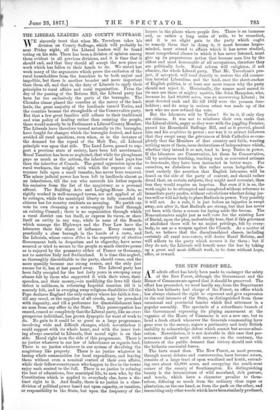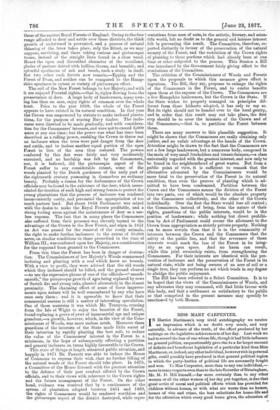THE NEW FOREST BILL.
AN adroit effort has lately been made to endanger the safety of the New Forest, although the Government and the House of Commons are agreed that it should be preserved. The effort has proceeded, we need hardly say, from the Department which has hitherto had charge of the Forest, an office which has always claimed the right to represent and give expression to the real interests of the State, as distinguished from those occasional and provincial fancies which find utterance in a popular assembly. The spectacle of a subordinate branch of the Government expressing its pitying amazement at the vagaries of the House of Commons is not a new one, but to head a fresh attack whenever the Generals commanding have gone over to the enemy, argues a pertinacity and truly British inability to acknowledge defeat which cannot but arouse admi- ration. Nevertheless, it is not desirable in this case that per- severance should meet with success ; on the contrary, the interests of the public demand that victory should rest with the hitherto successful forces.
The facts stand thus. The New Forest, as most persons, through recent debates and controversies, have become aware, consists of a large tract of open woodland and heath, extend- ing over about 63,000 acres, and occupying the south-west corner of the county of Southampton. Its distinguishing beauty is the intermixture of wild moorland, rich pasture, and woods, which have a character peculiar to them- selves, differing as much from the ordinary close copse or plantation, on the one hand, as from the park on the other, and resembling only other woods which have been similarly produced, those of the ancient Royal Forests of England. Owing to the free. range afforded to deer and cattle over these districts, the thick growth of underwood is prevented, and a process of natural thinning of the trees takes place, only the fittest, as we may suppose, surviving, and these taking various and picturesque forms, instead of the straight lines found in a close wood. Hence the open and diversified character of the woodland, glades of pasture dotted with hollies, thorns, and bramble, and splendid specimens of oak and beech, each a study in itself. But two other such forests now remain,—Epping and the Forest of Dean, and neither can be compared to the Hamp- shire specimen in extent or variety of picturesque effect.
The soil of the New Forest belongs to her Majesty, and with it are enjoyed Forestal rights,—that is, rights flowing from the preservation of deer. A large body of landowners, many own- ing less than an acre, enjoy rights of common over the whole tract. Prior to the year 1698, the whole of the Forest appears to have existed in its natural condition. In that year the Crown was empowered by statute to make inclosed planta- tions, for the purpose of rearing Navy timber. The inclo- sures were directed to be made gradually, and with considera- tion for the Commoners' interests, and were not to exceed 6,000 acres at any one time; but the power was what has since been described as a rolling power, enabling the Crown to throw out an inclosure when the trees were past danger from the deer and cattle, and to inclose another equal portion of the open Forest in lieu of the area thus restored. The powers conferred by this Act were fairly and very moderately exercised, and no hardship was felt by the Commoners, nor, it is believed, did the picturesque aspect of the Forest suffer to any considerable extent, some of the woods planted by the Dutch gardeners of the early part of the eighteenth century possessing in themselves no ordinary beauty. Probably a reason for the forbearance of the Crown offirjale may be found in the existence of the deer, which neces- sitated the erection of such high and strong fences to protect the young plantations that the process of inclosure was rendered inconveniently costly, and prevented the appropriation of too much pasture land. But about 1848 Parliament was seized with the desire to make the Royal Forests profitable, and a strong feeling arose against the maintenance of deer as a use- less expense. The fact that in many places the Commoners also suffered from their presence was cleverly turned to the advantage of the. Crown in the New Forest, and when in 1851 an Act was passed for the removal of the costly animals, the right to make further inclosures to the extent of 10,000 acres, on similar conditions to those prescribed in the time of William III., was conferred upon her Majesty, as a consideration for the supposed boon granted to the Commoners.
From this time the Forest has been in danger of destruc- tion. The Commissioners of her Majesty's Woods commenced inclosing and planting with a zeal which knew no bounds. With a view to profit, they were advised that the old woods which they inclosed should be felled, and the ground cleared —to use the expressive phrase of one of the officials—" smack- smooth," the picturesque growth of ages being replaced by rows of Scotch firs and young oaks, planted alternately in the closest proximity. The charming effect of some of these improve- ments upon nature will be well remembered by any who have once seen them ; and it is agreeable to know that their commercial success is still a matter of interesting speculation, One of these nurseries it was which Mr. Tennyson, crossing from the Isle of Wight to enjoy the beauties of the Forest, found replacing a grove of yews of immemorial age and unique grandeur,—a growth, however, which, in the view of the Com- missioners of Woods, was mere useless scrub. Moreover these guardians of the interests of the State made little secret of their intention by rapidly planting the best soils to reduce the value of the Commoners' interest in the Forest to a miniraum, in the hope of subsequently effecting a partition and general inclosure on terms highly favourable to the Crown. This state of things at length attracted public attention, and happily in 1871 Mr. Fawcett was able to induce the House of Commons to express their wish .that no further felling of the natural woods of the Forest should take place. In 1875, a Committee of the House listened with the greatest attention to the defence of their past conduct offered by the Crown officials, and to their views with reference to the Crown rights and the future management of the Forest. On the other hand, evidence was received that by a continuance of the system of plantation adopted between 1851 and 1869, the rights of Commoners would be rendered worthless and the picturesque aspect of the district destroyed, while repre-
sentatione from men -of note, in the artistic, literary, and Bolen- tific world, left no doubt as to the general and intense interest felt in preventing this result. The Committee, therefore, re- ported distinctly in favour of the preservation of the natural scenery of the Forest, and the restriction of the Crown rights of planting to those portions which had already been at one time or other subjected to the process. This Session a Bill was introduced by the Government fairly giving effect to the resolutions of the Committee.
The criticism of the Commissioners of Woods and Forests upon the proposals to which this measure gives effect is ingenious. The Bill, they say, proposes to enlarge the rights of the Commoners in the Forest, and to confer benefits upon them at the expense of the Crown. The Commoners are a. few Hampshire landowners, but the Crown is the State. If the State wishes its property managed on principles dif- ferent from those hitherto adopted, it has only to say so. But its right should not be handed over to the local gentry, and in order that this result may not take place, the first step should be to sever the interests of the Crown and of the Commoners,—that is, to partition the Forest between them.
There are many answers to this plausible suggestion. It might be shown that the Commoners are really obtaining only justice, and no unfair advantage at the hands of the Crown. Attention might be drawn to the fact that the Commoners are not a few large landowners, but a numerous body, composed in the main of very small freeholders and tenant-farmers,—a class universally regarded with the greatest interest, and now only to be found in the neighbourhood of great wastes. But from a public point of view, it is sufficient to remark that the alternative advocated by the Commissioners would be more fatal to the preservation of the Forest in its natural condition, than even the process of planting which is ad- mitted to have been condemned. Partition between the Crown and the Commoners means the division of the Forest into two parts, one of which would be the absolute property of the. Commoners collectively, and the other of the Crown individually. Over the first the State would lose all control ; the Commoners, instead of being, from the nature of their rights, guardians of the public interests, would be in the position of landowners ; while nothing but direct prohibi- tion by. Act of Parliament could secure the allotment to the Crown from appropriation as strictly privataproperty. Nothing can be more certain than that it is in the community of interests between the Crown and the Commoners that the safety of the public lies, and that the severance of these interests would mark the loss of the Forest in its integ- rity as an open space. And no harm can result, while this joint ownership exists, from strengthening the Commoners. For their interests are identical with the pre- vention of inclosure and the preservation of the Forest in its natural state, while not being owners of an acre of soil or a single tree, they can perform no act which tends in any degree to abridge the public enjoyment.
The Bill has been referred to a Select Committee. It is to be hoped that the views of the Commissioners of Woods, and any advocates they may command, will find little favour with this body, and that a settlement so satisfactory to the public as that comprised in the present measure may speedily be sanctioned by both Houses.



































 Previous page
Previous page